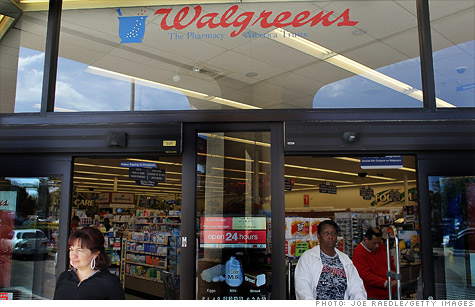Search News

Waglreens, the nations largest drugstore chain, is gearing up to launch a private health insurance exchange this fall, according to people familiar with the matter.
NEW YORK (CNNMoney) -- Walgreens, the nation's largest drugstore chain, is planning to start selling health insurance to customers this fall.
Deerfield, Ill.-based Walgreens (WAG, Fortune 500) will sell health insurance products with different price ranges and coverage levels from coast-to-coast through a private health insurance exchange, according to people familiar with the matter.
Walgreens neither confirmed nor denied the move. "As always, we're looking at a number of options in light of health care reform as we continue to seek ways to help our customers better navigate today's health care system," a Walgreens spokesman said.
Health reform mandates the creation of federal and state-funded public health insurance exchanges by 2014 that will offer subsidized insurance for uninsured and underinsured people.
A rush of companies, many not usually associated with health insurance, are also expected to jump into the nascent but lucrative market for health insurance exchanges -- estimated to be worth billions of dollars -- ahead of 2014.
Retailers, financial services providers and a large payroll processer are among firms that are actively looking into starting private health insurance exchanges that are separate from public exchanges, industry watchers said.
TripleTree, an investment banking firm focused on the health care and technology market, estimates that from 2014 through 2019, as many as 36 million consumers will buy their health insurance from exchanges.
"For retailers, [creating a private insurance exchange] is a way to generate more revenue from a new business," Chris Hoffman, TripleTree's chief marketing officer, said.
"Those companies that get their exchanges up and running before 2014 could also succeed in stealing customers away from the public exchanges," he said.
For uninsured and underinsured consumers, private exchanges could be way to get access to health insurance at more affordable rates than what they are getting now by buying insurance directly from insurers, he said.
However, Hoffman did point out one important distinction between public and private health insurance exchange. Consumers who are eligible for government subsidies can take advantage of them only in public exchanges and not in private exchanges.
Still, he said private exchanges will try to remain competitive with public exchanges by offering their customers other incentives to join, such as loyalty programs that tie in discounts and bundling other types of insurance like life insurance along with their health insurance products.
Walgreens, the No.1 seller of pharmacy and health and beauty products, already provides health care services that treat minor illnesses and offer seasonal flu shots and vaccinations through its more than 350 in-store "take care clinics."
By partnering with some of the nation's largest health insurers, selling health insurance is a natural next step in Walgreens' evolution into becoming a one-stop shop for all health care needs.
Consumers will be able to shop for a mix of insurance products online, through call centers or in-store. Some will be branded by national insurers and others will be "private label" insurance products sold through Walgreens' insurance exchange. ![]()